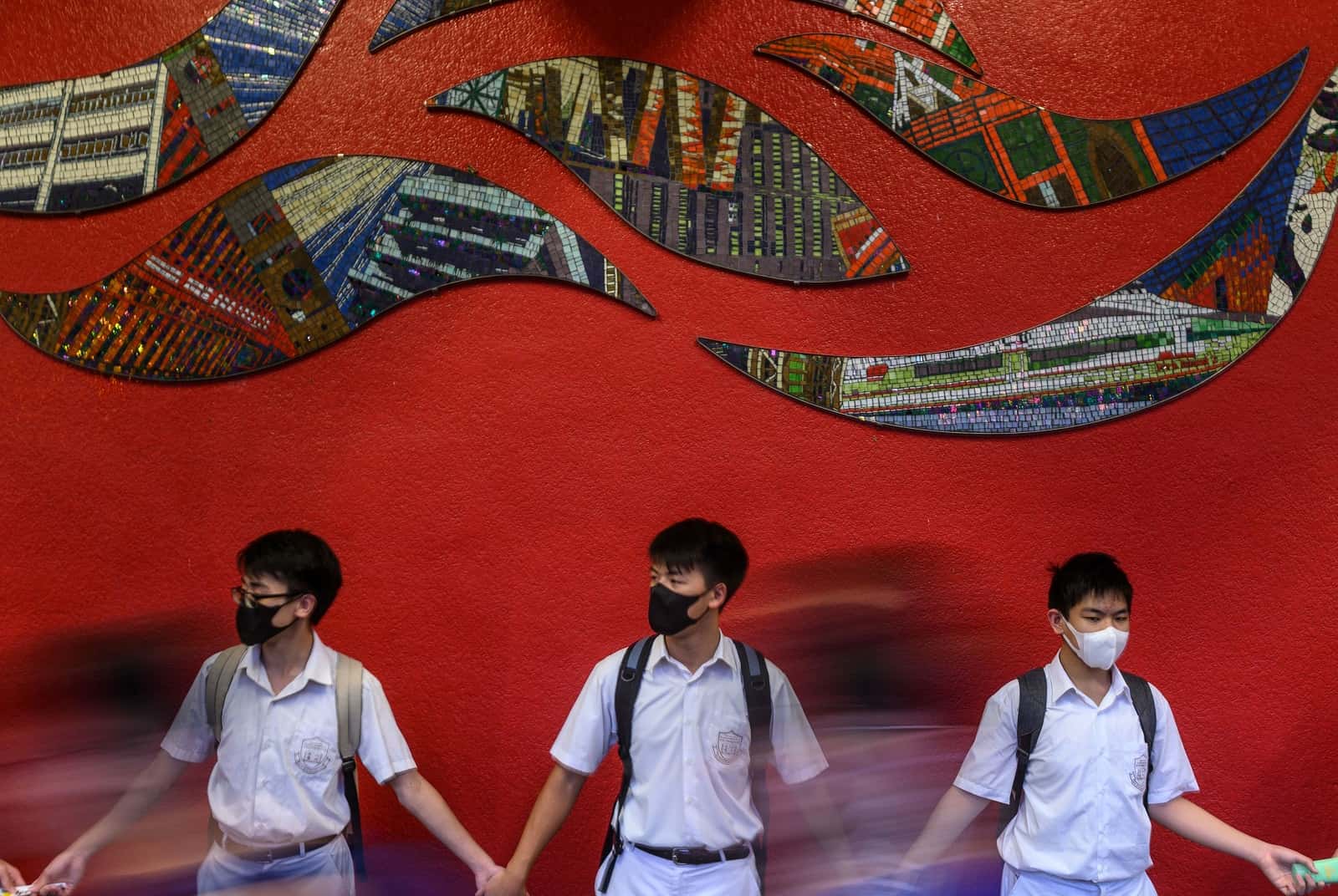Hong Kong teenagers looking to Taiwan for schooling

Source:Getty Images
Taiwan is planning to open up its high schools to students from Hong Kong and Macao from next autumn, hoping to tap young talent while providing a safe haven from increasing political oppression. But there are also concerns that this could create national security risk. How can Taiwan balance these conflicting interests?
Views
Hong Kong teenagers looking to Taiwan for schooling
By Linden Chenweb only
“In the past, Taiwanese parents used to send their kids to Hong Kong to attend university because it looked good on a CV; now we Hong Kong parents want to send our kids to Taiwan to attend high school for the sake of freedom and survival,” says Xiao-wen (a pseudonym), a 50-year-old immigrant from Hong Kong, commenting on the news that Taiwan is going to open up its high schools to students from the two special administrative regions of China.
Xiao-wen served as an elementary school teacher in Hong Kong but immigrated to Taiwan before protests against a controversial extradition law erupted in Hong Kong in March 2019.
“In Hong Kong you don’t have life; you can only struggle for survival,” says Xiao-wen, who looks back on a two-decades-long teaching career. As a double-income couple, Xiao-wen and her white-collar husband earned around NT$359,000 per month and put aside money for their retirement all their working lives. Yet, upon her planned retirement at age 60, she would have only been able to pay rent for another ten years, not including living costs. Buying property would have been out of the question.
Having witnessed China’s clamp-down on dissent in Hong Kong from the suppression of the anti-extradition bill protests to the introduction of the national security law, Xiao-wen believes that the Hong Kong she grew up in has changed beyond recognition. She is still in touch with her former students, many of whom voice similar concerns that Hong Kong will never regain its past liberty, but she feels there is not much that can be done.
Given the increasing political oppression, Taiwan is willing to open its high schools to students from Hong Kong. So far, Hong Kong youngsters can only enjoy compulsory education from elementary school through junior high school if they have Taiwanese residence permits and are accompanied by a legal guardian. At the senior high school level, only selected schools that cater to overseas Chinese are open to them.
Taiwan’s Ministry of Education last year invited comments on the amendment of the Regulations for Hong Kong and Macao Residents Studying in Taiwan. The amended version, which no longer makes residency a precondition for enrolling at a local school, was passed by the Ministry on August 10. Also scrapped was the restriction of senior high school students to special overseas Chinese schools. This means that all senior high schools in Taiwan can enroll youngsters from Hong Kong and Macao, although the new scheme is going to be implemented for the 2022-2023 school year starting next September at the earliest.
With other main avenues of immigration becoming narrower, the schooling track could provide a long-term perspective for prospective Hong Kong and Macao immigrants. If young people from Hong Kong and Macao attend senior high school and university in Taiwan, they can stay for work upon graduation for a period of five years. If during these five years they stay in Taiwan for at least 183 days per year and earn an average monthly salary of twice the minimum wage, they are entitled to apply for permanent residency.
Reason No. 1: Fishing for talent
Taiwan’s welcoming gesture is actually motivated mainly by self-interest. As an aging society, the island needs young skilled people. Bringing youngsters from Hong Kong and Macao to Taiwan for school education and further studies increases the chances that they will stay for good and build their careers and livelihoods in Taiwan. This would help to internationalize Taiwan’s labor market.
Under the old regulations, different rules applied to foreign nationals and Hong Kong and Macao citizens. Children with foreign passports can attend schools in Taiwan, even if they are not accompanied by a legal guardian. However, under the Constitution of the Republic of China, citizens of Hong Kong and Macao are not considered “foreigners”.
Wei Jia-hui is executive director of unews.com.tw, an online platform that helps students with university applications. Wei says she is being approached for advice by many parents and students from Hong Kong. A typical situation is that a family has already been granted approval to resettle in Taiwan, but the parents still need to stay in Hong Kong for work. They hope to send their kids to Taiwan to attend school first but are at a loss as to how to achieve this given the legal restrictions.
Some families who do not qualify for immigration to Taiwan under the currently available schemes hope to eventually gain residency via their children. If the children move to Taiwan first to attend senior high school, they can look for work upon graduation. Once they gain permanent residency, their family members can enter Taiwan on a family-based visitor visa.
On the other hand, parents see the added benefit that their children enjoy freedom of speech and academic freedom in Taiwanese schools, civil liberties that are increasingly being curtailed in Hong Kong.
“In Hong Kong textbooks, even the Tiananmen Square protests are being obfuscated by portraying them as a student movement,” says a recent immigrant from Hong Kong, who resettled in Taiwan with his wife and daughter and runs an immigration consulting firm. Due to the developments over the past years, the liberty of the Hong Kong people and basic democratic values have been eroded. “We can’t go back; it is only going to get worse,” he adds, noting that, since Taiwan still safeguards these values, it is an attractive place for people from Hong Kong.
Reason No. 2: Rescuing Dissident Youth
Another reason for the government to welcome high school students from Hong Kong and Macao is to demonstrate its concrete support for the democracy movement in Hong Kong, in particular the teenagers who participated in the anti-extradition bill protests.
An activist who helped young Hongkongers escape to Taiwan during the height of the protests is concerned that those still in Hong Kong might be indicted under the National Security Law and put behind bars, if Taiwan does not offer them a way out by enrolling them in Taiwanese schools.
Before the amendment of the Regulations for Hong Kong and Macao Residents Studying in Taiwan, even those who had already made it to Taiwan and whose cases were handled by the Taiwan-Hong Kong Service and Exchange Office were in legal limbo. Since Taiwan does not have a legal procedure for political asylum in place, many were not able to obtain residency, not to mention attending local schools.
 (Source: CommonWealth Magazine)
(Source: CommonWealth Magazine)
As Wang Si, deputy secretary-general of the Taiwan Association for Human Rights (TAHR), explains, the government is showing flexibility in dealing with individual cases. But in contrast to other countries, Taiwan does not have a legal procedure to apply for refugee status and does not grant asylum seekers temporary residence. Instead, refugees from Hong Kong must apply under the Regulations Governing Permits for Hong Kong and Macao Residents Entering the Taiwan Area and Setting up Residence or Registered Permanent Residence in R.O.C. This means they can only obtain legal residence status if they cite “ordinary reasons for setting up residence”.
Ironically, seeking asylum in Taiwan is not considered an ordinary reason. German public radio Deutsche Welle reported that a Hong Kong student who fled to Taiwan began to look for a school more than a month after his arrival. But because he could not produce a residence permit, schools kept rejecting him, and he was also unable to buy a SIM card, get a driver’s license or work to support himself.
Many more find themselves in the same predicament. It took the student a year and a half before he had figured out a way to get admitted to a school, gain a student visa, and a residence permit.
Opening up high schools to youngsters from Hong Kong and Macao won’t fix the entire problem. “But at least they [the students who participated in the democracy protests] are given an opportunity to study in Taiwan,” notes the activist.
Risk: National security
In Taiwan, some have misgivings about the new policy, arguing that national security could be at risk if China sent spies in the guise of Hong Kong refugees.
Presently, students from Hong Kong and Macao who are older than 20 must apply for a certificate of no criminal conviction with their own governments and submit it when applying for a residence permit in Taiwan.
To defend against national security risks, the government carries out background checks and mandates a joint review by several ministries of applications for residence or permanent residence if the applicant is a Hong Kong or Macao citizen who originally hails from China or once held or still holds a position in the Chinese Communist Party, the Chinese government, or the Chinese military.
Sang Pu, head of the Taiwan-Hong Kong Association, believes that whether a person could constitute a national security risk should not be determined based on family or educational background. Social media accounts such as Facebook and Instagram could serve as better clues.
In the long-term, efficient substantial investigations could be carried out to find out which people constitute a real threat to national security, Sang suggests.
Have you read?
♦ New directions in cross-strait relations: Richard Bush
♦ Taiwan businesses: Exiting China not an option amid struggle for survival
Translated by Susanne Ganz
Edited by TC Lin
Uploaded by Jane Chen






